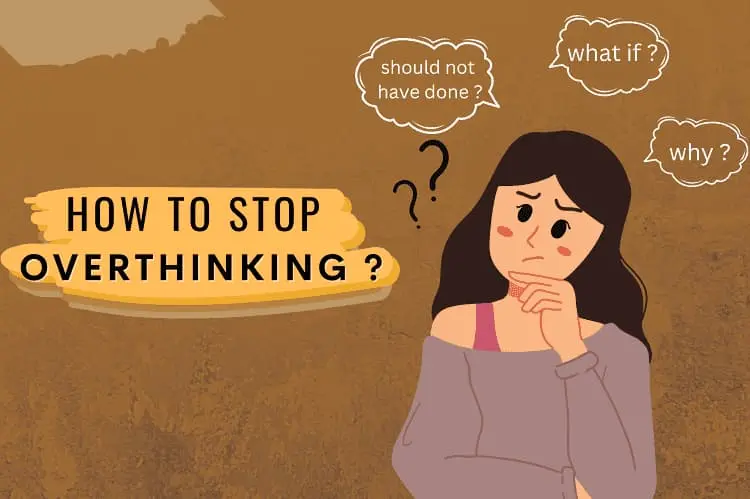Worry is a fire. One feels paralyzed by fear that something negative could happen. Being cautious is being attentive, whereas worrying is having fears that consume you from within. Since one’s own ego and feeling of “doer-ship” are the primary causes of all stress and problems in life, realizing who the true “doer” in this world it would be the ultimate way to stop worrying. Realizing Self and learning the science of doership is the first step in acquiring this knowledge.
What Is Overthinking?
When you repeatedly think about the same thing or scenario until it interferes with your life, this is overthinking, also known as rumination. The two main types of overthinking are dwelling on the past and fretting about the future. Overthinking might make you feel “stuck” or prevent you from moving forward at all. It may be hard to focus on anything else or to push the ideas from your head.
Being preoccupied with a stressful circumstance in the near term may lead you to act. For instance, being anxious before a crucial job presentation might motivate you to perform quickly. To guarantee you are on time, you will put a lot of effort into the assignment and leave a little early on the day . It turns unhealthy when it hinders your ability to act or meddles with your day-to-day activities and well-being.
Why Do We Overthink?
Overthinking is a strategy used to feel in control of a circumstance and more certain about the next course of action. Overthinking causes the brain to go into “analytical mode.” To lessen your worry, it starts to run through potential situations and make predictions about what will happen.
But when you overthink, it frequently keeps you from doing since it’s difficult to get out of the analysing phase. Rumination is a problem for people of all ages, genders, and personality types, but those who are driven by success may be more prone to it. Even perfectionists and overachievers have tendencies to overthink leading to replaying or criticizing decisions and mistakes.
Is Overthinking A Concerning Matter?
Research has discovered that overthinking frequently co-occurs with other mental health issues. Overthinking and other mental health problems have been linked in research throughout the years. It can be exacerbated by high stress, anxiety, and depression levels. Overthinking, meanwhile, may lead to more stress, worry, and despair.
Following a traumatic experience, it’s also typical to exhibit hypervigilance, or the tendency to always be on high alert for danger. Some people see hypervigilance as obsessing about potential warning signals of disaster. It is possible for our brain to get “stuck” in an elevated fight-flight-freeze phase and continue to look for real or imagined dangers.
However, overthinking is not a very frightening concern. Consulting a counselor or a therapist can help reduce or overcome the issue of overthinking gradually. It all depends on whether you are taking the step to take care of yourself- it plays a very important role in the process of self-care.
How Can We Stop overthinking?
Although it won’t happen right away, you can stop the pattern of overthinking. To begin, remember these five tips from experts:
1) Keep A Record of Tendencies and Triggers
A little awareness and attentiveness may go a long way toward getting a grip on overthinking. Keep a notebook and note particular instances when you overthink or worry. After some practice, you’ll start to spot trends and spot overthinking triggers before they occur. This will assist you in creating a coping mechanism for circumstances that you anticipate may result in overthinking.
2) Challenge Your Ideas
You don’t have to accept everything your mind tells you, despite it may not seem like it. To stop overthinking, try challenging your anxieties and ruminations and trying to see things from a different perspective.
3) Enlist Some Assistance From Your Pals
Do others frequently comment on your stress or overthinking? They may be right after all. Asking a reliable buddy to weigh in with their opinions and prod you when you seem to be caught in your brain might help you gain some perspective on a situation.Select a companion who is adept at preventing overthinking. According to research, co-rumination—excessively talking about and going over difficulties with friends—can increase anxiety.
4) Move Around
Plenty of evidence suggests exercise may benefit depression, anxiety, and other mental health conditions. Exercise may also be beneficial for persistent overthinking. Endorphins and other feel-good hormones can flood our brains after only a 5-minute stroll around the block. Your nervous system may be able to exit the fight-flight-freeze phase with the support of physical activity. This might stop any ruminations you’re having because of a traumatic event.
5) Don’t Hesitate From Seeking Help
It can be beneficial to consult a mental health professional or discuss the issue with your primary care physician if [overthinking] seems to be controlling your life more than you’d like. If left uncontrolled, the stress brought on by overthinking could also result in physical health problems, such as:
a – Headaches
b – Fatigue
c- Digestive problems such as diarrhoea or nausea
d -Insomnia
A therapist or counsellor can help you acquire coping mechanisms to control rumination if you struggle with overthinking. The underlying reasons for overthinking, such as anxiety or sadness, can also be found and treated with their assistance.
(Conclusion)
When you overthink, your anxieties and ideas run in a never-ending cycle. Overanalyzing frequently prevents you from taking action because you’re paralyzed by fear, rather than preparing you for the following stages. It can become the starting point of early signs of anxiety, depression, and other mental health issues. You can attempt questioning your thoughts, asking loved ones for support, or seeking additional assistance from a mental healthcare expert to quit overthinking.












